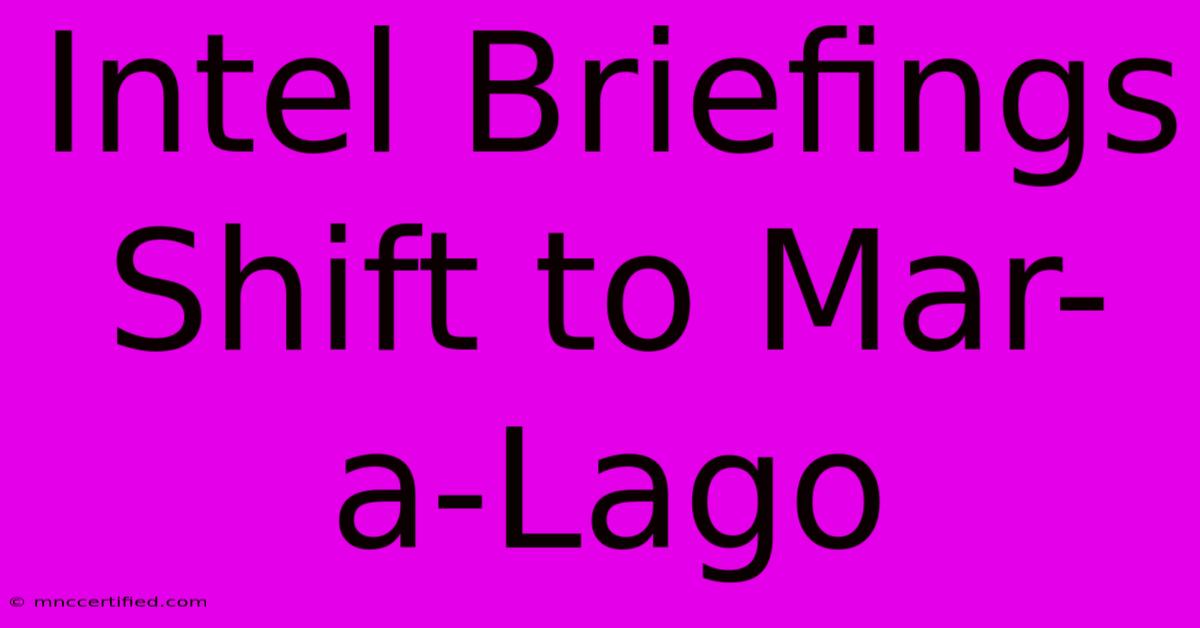Intel Briefings Shift To Mar-a-Lago

Table of Contents
Intel Briefings Shift to Mar-a-Lago: Security Concerns and Political Fallout
The shift of intelligence briefings to Mar-a-Lago, former President Donald Trump's Florida resort, during his presidency sparked significant controversy and raised serious questions about national security. This article delves into the details of this practice, examining the security risks, the political implications, and the ongoing debate surrounding its appropriateness.
The Controversial Venue: Mar-a-Lago
Mar-a-Lago, while a luxurious private club, presents a unique set of challenges when considered as a location for highly sensitive national security briefings. Unlike secure government facilities, Mar-a-Lago has a less controlled environment with a constant flow of visitors, including foreign nationals, potentially compromising classified information. The resort's open architecture and lack of dedicated secure communication facilities further exacerbate these concerns.
Security Risks Associated with Mar-a-Lago Briefings
The potential for unauthorized access to classified information at Mar-a-Lago is a major concern. The presence of numerous individuals, including guests, staff, and potentially even foreign agents, significantly increases the risk of leaks or espionage. The lack of robust security protocols comparable to those in place at secure government facilities elevates this risk to unacceptable levels. Experts have highlighted the vulnerability of classified information shared in such an environment, potentially endangering national security.
Compromising National Security: The Gravity of the Situation
The handling of sensitive intelligence requires the utmost discretion and security. Conducting briefings in an environment like Mar-a-Lago, lacking the rigorous security measures employed in official settings, raises significant concerns about the integrity of national security. The potential for unintended disclosures, both accidental and intentional, presents a clear and present danger.
Political Ramifications and Public Reaction
The decision to hold intelligence briefings at Mar-a-Lago drew immediate and widespread criticism from various political factions and security experts. The act was widely perceived as a breach of protocol and a potential threat to national security. The lack of transparency surrounding the practice further fueled public concern and debate.
Public Outrage and Calls for Accountability
The public outcry over the use of Mar-a-Lago for intelligence briefings underscores the deep concern about the potential for compromised national security. Many called for greater transparency and accountability regarding the decision-making process that led to this practice. The incident highlighted the importance of adhering to established security protocols and safeguarding sensitive information.
Political Divisions and Lasting Impact
The controversy surrounding the briefings at Mar-a-Lago continues to be a point of contention, reflecting the broader political divisions in the country. The debate has highlighted the need for clear guidelines and protocols for handling sensitive information, particularly in locations outside of secure government facilities. The long-term impact on public trust in government handling of national security remains to be seen.
The Ongoing Debate: Lessons Learned and Future Implications
The episode serves as a stark reminder of the importance of maintaining the highest standards of security when handling classified information. It sparked a necessary conversation regarding the suitability of various locations for sensitive briefings and the need for robust protocols to prevent future breaches.
Strengthening Security Protocols: Preventing Future Incidents
Moving forward, the incident necessitates a review and potential strengthening of security protocols related to intelligence briefings. This should include a clearer definition of appropriate locations and a more rigorous vetting process for any alternative venues considered in the future.
Transparency and Accountability: Restoring Public Trust
To rebuild public trust, enhanced transparency regarding the handling of classified information is crucial. Clearer guidelines and mechanisms for accountability are needed to ensure that such incidents are avoided in the future.
The shift of intelligence briefings to Mar-a-Lago remains a significant event in American political and security history. The controversy highlighted the crucial need for rigorous security protocols and underscores the potential consequences of deviating from established norms when dealing with highly sensitive national security information. The ongoing debate emphasizes the importance of transparency, accountability, and unwavering commitment to safeguarding classified information.

Thank you for visiting our website wich cover about Intel Briefings Shift To Mar-a-Lago. We hope the information provided has been useful to you. Feel free to contact us if you have any questions or need further assistance. See you next time and dont miss to bookmark.
Featured Posts
-
Rooney Celebs Wealth Compared
Nov 22, 2024
-
Progressive Insurance Madison Wi
Nov 22, 2024
-
Mauras Take Rooney Vardy Dispute
Nov 22, 2024
-
Amersham Old Town High Street Closed
Nov 22, 2024
-
Restaurant Beef Recall E Coli
Nov 22, 2024